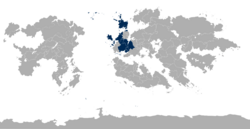West Aldinean Defence Organisation: Difference between revisions
No edit summary |
No edit summary |
||
| Line 3: | Line 3: | ||
| name = Northern Sea Defense Organization | | name = Northern Sea Defense Organization | ||
| pronounce = | | pronounce = | ||
| native_name = ''{{Collapsible list |title=Native Names|''Noardsee Ferdigeningsorganisaasje''({{wp|West Frisian Language|Jorvish}})<br>''Northrensea Pertection Union''({{wp|Scots Language|Lothican}})<br>''Nordsøens Forsvarsforbund'' ({{wp|Danish Language|Tynic}})}}'' | | native_name = ''{{Collapsible list |title=Native Names|''Noardsee Ferdigeningsorganisaasje'' ({{wp|West Frisian Language|Jorvish}})<br>''Northrensea Pertection Union'' ({{wp|Scots Language|Lothican}})<br>''Nordsøens Forsvarsforbund'' ({{wp|Danish Language|Tynic}})}}'' | ||
| native_name_lang = | | native_name_lang = | ||
| named_after = {{wp|North Sea|Sea of Njord}} | | named_after = {{wp|North Sea|Sea of Njord}} | ||
Revision as of 16:45, 5 May 2019
 Flag of NOSDO | |
 Badge of NOSDO | |
 Member states of NFO | |
| Abbreviation | NOSDO, NFO |
|---|---|
| Named after | Sea of Njord |
| Motto | Fra hav til hav |
| Predecessor | Tynic Alliance, West Nordanian League |
| Merged into | 1973 |
| Founder | Sjealand, Jorland and Lothican and Vasturia |
| Founded at | Ullelfrborg, Vasturia |
| Type | Military alliance |
| Purpose | Common Defence and military cooperation |
| Headquarters | Kaldfestning, Jorland and Lothican |
Region | Nordania |
Membership | Member States of NFO |
Official language | Tynic and Jorvish |
Marshall of the Sea of Njord | Alf Erstad |
Chief Ambassador | Gjilke Van Der Zwaag |
Supreme Commander | Asvald Svartgeirrsson |
Budget (2015) | 731 Million USD |
| Expenses (2017) | 42,41 Billion USD |
The Northern Sea Defense Organization (NFO, due to its Jorvish and Tynic names), informally known the Northern Alliance or simply NOSDO, is an intergovernmental military alliance between five Nordanian countries, all bordering the Sea of Njord, commonly referred to as the Northern Sea, hence the name. The organization implements the North Sea Treaty that was signed on 2 May 1973 after the end of the War of the Njord. NFO Headquarters are located in Kaldfestning, the capital of Jorland and Lothican while the headquarters of the Central Allied Operational Command is located in Circevík, Vestmannaland.
Since it was founded the number of memberstates have remained at the first 4, even as cooperations with other countries have been strengthened, notably a series of military observers studying with the military of the Union of Nautasian Islamic Republics. The stated goal of the organization is officially to keep the peace in the Sea of Njord and to protect the common interests of the member nations, while unoficially the alliance has often been referred to as an anti-Ambrosian and anti-Swastrian alliance.
History
Initial Agreements
Nordanian geo-politics had been strained during the 50's and 60's as the heightened tensions in Borea and Conitia threatened to cause a spillover in Nordania, with various nations aligning themselves to eachother. The Sea of Njord had already been host to conflict in the two previous wars and lingering irredentist claims were re-stated during the latter half of the sixties, with Ambrose being especially aggressive. The administrations of Salem Hornblower and Husband Kipling revived Ambrosian interest in the Tårnøerne archipelago and attempted to increase Ambrosian naval presence through various incursions into Sjealandic and Vasturian waters. At the same time Vasturia and Ambrose had seen increasing border tensions over the Glencamber valley and a few dozen villages, which irked the government of Jorland and Lothican, which had earlier been drawn into conflict because of Vasturia and Ambrose and wished to strengthen Vasturia as a buffer.
Mean while in the Tynic Sea conflict between Swastria and Sjealand had narrowly been avoided in the fifties as unclear naval borders had been solved with the establishment of the Tynic Commission, but the Seemark troubles had strained Swastro-Sjealandic relationships. Swastria had cracked down toughly on the calls of self-determination from ethnic Tynics while Sjealand had been covertly funding and training paramilitary groups in Seemark, hoping to see reunification with the Tynic minority in Swastria.
Role of Ambrose
Ambrose was the prime catalyst for the founding of the Northern Sea Defense Organization. As a heavily militarized nation, with a strong and modern military, Ambrose was a force to be reckoned with; the country's previous involvment in the Great War of the North and the Continental War, had left the Sjealandic and Vasturian governments heavily opposed to Ambrose, whom they viewed as their natural enemy. The outbreak of the War of the Njord also saw a massive decrease in willingness to employ diplomacy, and while Sjealand won the conflict in the end the war still left many in both the Sjealandic and Vasturian administrations wishing for a better coordinated response to Ambrosian aggression. In Jorland and Lothican, the initial invasion of the Tower Islands had proven that Ambrose had the means and soldiers to succesfully penetrate deep into both the Sea of Njord, and possibly on continental Nordania. Given the close ties between them and Vasturia, the government saw cooperating with Vasturia as their best choice of action.
In the aftermath of the war Sjealand and Vasturia signed the Treaty of Dagmar on 17 October 1971 as a Treaty of Alliance and Mutual Assistance in the event of a future possible attack from Ambrose and its allies in Cradebetia. The Vasturian Consul of Diplomatic Affairs advocated in 1973 for the ascension of Jorland and Lothican to the alliance, to further bolster its naval and land capabilities, creating an alliance centered around the Sea of Njord. The objective would in the end be a consolidation of aligned states around the sea to outpace Ambrose and Swastria and to rival the great powers of Esquarium. The negotiating conference was held on 26 January 1978, a few days after a large terrorist bombing in Asgård; thanks to this, the Jorvish delegation was convinced of the very real threat of future conflict, and even suggested to the others to agree to the concept of automatic and immediate mutual assistance in the event of aggression, and to the idea of setting up a regional organisation.
Role of Swastria
While the role of Swastria was more limited in Vasturia and Jorland and Lothican, the Sjealanders were vehemently adamant that Swastria be positioned as the same threat Ambrose posed. Granted, the Sjealanders had fought over three dozen wars with the Swastrians historically, and successive administrations in Sjealand after the Great War of the North had been vehemently anti-Swastrian. Swastria had historically invaded Sjealand several times thanks to its use of Ambrose to split the larger Sjealandic army, and Sjealand feared that a focus on only Ambrose would invite Swastria to test Sjealandic defences. In addition the Seemark troubles had seen a spike in Swastro-Sjealandic tensions. The province of Seemark in Swastria was almost exclusively ethnically Tynic and many in Sjealand and Seemark wished for re-unification. This was stamped down hard by the Swastrian government, and hardliners on both the right and left began working against the Swastrian government, through strikes, riots and terrorist attacks. Both Seemark and Wittburg would see many bombings and shootings from Tynic nationalists, and in response Swastrian cells would carry out terrorist attacks in Sjealand. Both of these groups saw support from their respective governments, with some Tynic groups recieving arms and training in Sjealand. As a result the Sjealandic delegation was adamant that Swastrians be given equal status to the Ambrosians, which the others acquiesced to.
Late 20th Century
Modern History
Military Operations
Early operations
Operation Skjöldr
Operation Eyðimörkin
Kaldfestning Project
Participating countries
INCLUDE MAP OF MEMBERS